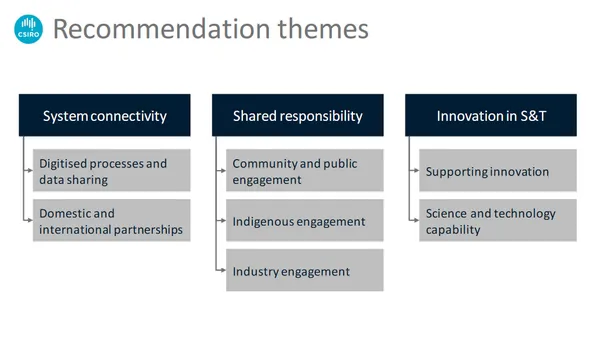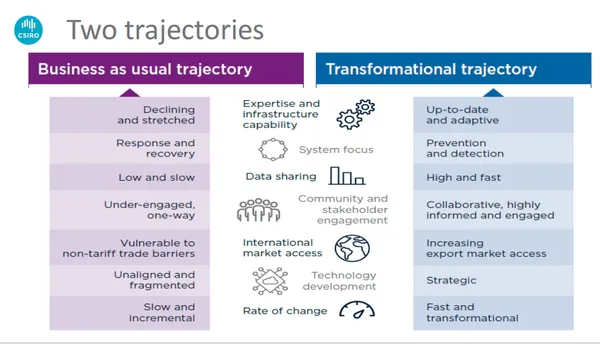Australia's Government agency responsible for scientific research says while the country has a "fantastic" biosecurity system that protects farmers, the current system is going to struggle within a decade if it does not evolve and develop.
The Commonwealth Scientific and Industrial Research Organisation (CSIRO) explained to the ABARES Outlook 2021 conference that the system needs a "re-think" that includes cross-jurisdictional and cross-disciplinary discussion. The organisation last year published a report titled "Australia's Biosecurity Future" looking at future recommendations for 2030. Senior CSIRO Principal Research Scientist Dr Andy Sheppard says there were 20 recommended actions across three main themes, with the first surrounding System Connectivity.
"The first element is digitising and data sharing - and improving this, especially between jurisdictions and sectors, and incorporating strong stakeholder groups of industry, government and community will provide significant benefit," Dr Sheppard said. "It is particularly important for understanding emerging risks and optimising response activities. System Connectivity is also important for market access and ensuring modernised trade systems. Also critically important, is that system connectivity will streamline domestic trade and strengthen international relationships. We need better biosecurity in our immediate trading regions, supported by more efficient sharing of pre-border intelligence, the reducing of supply chain risks and the joint development of policies and standards promoting better biosecurity outcomes."

The second theme that Dr Sheppard outlined was Shared Responsibility, which he says is currently a poorly defined term when it comes to biosecurity. In addition to the government's heavy role, he says there needs to be more "two-way" community, indigenous and industry engagement. This will lead to more trusting relationships between each of the stakeholder groups, and the reinforcement of responsibilities. The third theme is Innovation and Science and Technology, particularly supporting technology innovation and setting priorities that are agreed upon across all jurisdictions. This can be done, according to Dr Sheppard through an "innovation hub" concept to bring together private investors and small and medium-sized enterprises (SME) to collaborate on these areas and commercialise outcomes.
Dr Sheppard also noted that the COVID-19 pandemic and lessons learnt are not separate from the existing biosecurity frameworks, and is in fact part of Australia's national response.
"The focus of COVID is the impact on humans but the problems are all the same," he said. "So, all of the things that we are learning in the context of responding to COVID will have a role to play in improving our national security system. There will be some technologies that will be disruptive and give us a lot of advantages but they don't currently fit into the system."

Andrew Tongue from the Department of Agriculture, Water and the Environment's Biosecurity & Compliance Group also address delegates at the ABARES Outlook 2021. He says while Australia's biosecurity system safeguards our country from the costly and disruptive impacts of pest and disease risks and it makes a huge contribution to farming systems.
Mr Tongue agrees that despite having one of the most stringent biosecurity systems in the world, Australia has to keep getting smarter about how it uses its resources for protection and preparedness.
"Australia is one of the few countries in the world that takes biosecurity seriously," he said. "It safeguards our market access and reputation as a supplier of world-class produce. Through 'Ag 2030', Australia's agriculture sector has set the ambitions target of achieving $100billion farmgate output. Achieving that target will require a significant increase in productivity, but we also must maintain and improve our market access. Biosecurity is a key pillar for 'Ag 2030' and vital in reaching that $100billion target. There is a range of biosecurity challenges and some opportunities that we need to address to reach that ambitious target."

He added that maintaining the strong biosecurity system is no small effort, with millions of shipping containers on 20,000 commercial vessels and 140 million mail items arriving in Australia annually. Mr Tongue says each one needs to be assessed for biosecurity risk, and there have even been some increased challenges due to COVID-19.
"With the difficulty of finding containers, our main concern is that they are clean containers," Mr Tongue said. "We have seen a lot of dirty containers come into Australia and that means (pest and disease) hitchhikers, which are among our top plant pests. So, we have had to shift quickly to address that issue. This decade we will see more cargo arriving in Australia than ever before, and as the world starts recovering from COVID-19 more passengers will start arriving back in the country. So, we will continue to face significant and growing biosecurity risks that could be devastating. For example, the brown marmorated stink bug is a risk to our $9billion horticulture industry and $4billion fruit and nut industries. I think, what we will see is disruptions more frequently; so, everything we have learnt in the past is under challenge. It won't just be COVID, but might be earthquakes, or war, or other regional disruptions that will challenge how goods and people are moving across our borders."
Acting now and continuing to make the high investments is critical, according to Professor Tom Kompas from the Centre of Excellence for Biosecurity Risk Analysis (CEBRA) who told the conference that there is currently an estimated potential average of around 30 to 1 return on investment.
"If you detect things early, you avoid damages," he said. "There is a lot of gain from post-border activities. It is also important to note that our asset values here are flows of income, not necessarily the value of the asset, but the income they generate going forward. So, that's considerable; you are protecting a huge amount of money because you have a system in place."
ABARES Outlook 2021 is being hosted by the Australian Government Department of Agriculture Water and the Environment. It is being held virtually for the first time, to be run over four days with presentations aimed at the different agriculture themes and sectors.
